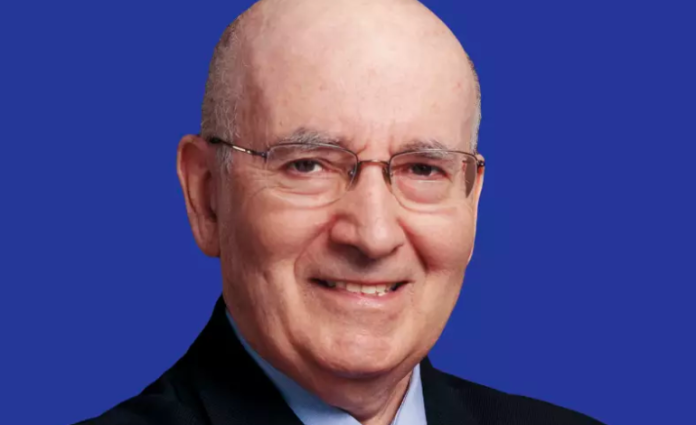Professor Philip Kotler, fondly known as the Father of Modern Marketing, is a living legend. Not only is he the founder of modern marketing principles, but he is also a man who has consistently lived by his values.
Addressing the inaugural National Marketing Day of Sri Lanka in 2022, I still remember him emphasising the importance of building a sustainable world for everyone.
Marketing, he said, is not about the overexploitation of human and natural resources—it is about ensuring that everyone has the opportunity to fulfil their needs and desires. This aligns well with the principles of inclusivity and sustainability.
Returning to the subject, in 2022 we aimed to honour Professor Kotler, as the entire Sri Lankan marketing community has gained valuable insights from his renowned book Principles of Modern Marketing. He was thrilled to receive such an honour at the age of 92, noting that no such recognition had been given to him even in his homeland.
He expressed deep gratitude for our heartfelt tributes. I would also like to express my sincere appreciation for the generous guidance and support provided by the esteemed Professor Nalin Abeysekara, Dean of the Faculty of Management at the Open University of Sri Lanka.
I hold deep admiration and gratitude for the opportunity provided to me by Global CEO Magazine. It is an honour to pay tribute to our hero, Professor Kotler, especially as he approaches his 94th birthday this May. This opportunity comes from the founder, Mr Anura Siriwardena, a veteran writer and educator who has profoundly impacted our lives—bringing back cherished memories of Vidusara from our childhood.
The Birth of Modern Marketing
Professor Kotler has witnessed numerous transformations in the theory and practice of marketing since earning his Master’s degree in Economics from the University of Chicago in 1953. In 1960, three years after earning his PhD in Economics from MIT, he joined the marketing department at the Kellogg School of Management, Northwestern University, alongside a distinguished group of faculty members including Sidney Levy, Stewart Henderson Britt, Richard Clewett, Ralph Westfall, and others.
In his classes, he used textbooks that explained marketing institutions and practices and offered prescriptive advice. However, these texts lacked a strong theoretical framework on consumer behaviour, were poorly supported by academic research, and failed to adequately describe how companies made real marketing decisions.
In 1963, he began writing his own textbook, Marketing Management: Analysis, Planning and Control. When it was published by Prentice-Hall in 1967, he believed it would either be a remarkable success or just another failed textbook. It turned out to be more successful than he expected.
Marketing professors valued it for elevating respect for the discipline, focusing on customer value, improving theoretical frameworks, incorporating academic research, clarifying decision-making processes, and providing compelling case studies of marketing success.
This marked the beginning of modern marketing as we know it.
What Was Marketing Like in the Past?
In the early 1900s, marketing appeared in economics textbooks, describing wholesaling, retailing, pricing, advertising, and sales forces. By the 1960s, marketing was relatively straightforward. A company would:
• Decide on product features and pricing;
• Secure distribution
• Hire an agency for advertising;
• And run a strong sales force;
Marketing was largely about selling. Business students often chose between finance, marketing, operations, strategy, or information systems.
Those with strong maths skills preferred finance or operations, while others chose marketing. It was engaging and filled with human-interest stories, but it later became more analytical and sophisticated. Two influential books expanded marketers’ understanding of consumer behaviour and reminded professionals of the many factors influencing attitudes and decisions.
The Broadening Concept in Marketing
In January 1969, Professors Sidney Levy and Kotler introduced an expanded view of marketing. They argued that marketing applies beyond commercial activities. Non-profit organisations—such as churches, universities, museums, city councils, and advocacy groups—also engage in marketing. Political parties use it in campaigns, and environmental groups like Greenpeace and the Sierra Club rely on it to promote change. Religious organisations also use marketing strategies to attract new members. These entities must adopt marketing tools to achieve their goals. Later publications continued expanding marketing’s reach into diverse domains.
As marketing evolved, it became more than a business function; it emerged as a philosophy that shapes organisational thinking. We owe a great debt to Professor Kotler for consolidating fragmented knowledge and establishing a coherent, respected discipline. His humility, even after decades of achievement, is admirable—especially as he nears his 94th year.
Professor Kotler once said, “You can learn marketing in a week, but it takes a lifetime to master. After fifty years of teaching, I’m still trying to master it. Don’t be fooled by the title ‘Father of Modern Marketing.’ If I stop following the latest developments, my knowledge will quickly become outdated.”
In Conclusion
We express our deep gratitude for his extraordinary contributions to marketing. The Sri Lankan edition of Essentials of Modern Marketing, featuring local brand stories and case studies, will soon be launched. As the official local representative of Professor Philip Kotler in Sri Lanka, I extend my best wishes for his continued health and happiness as he approaches his 94th birthday this May. As readers and admirers of his work, I am certain that your heartfelt wishes will also be with him—because blessings hold greater value than any measure of success.


